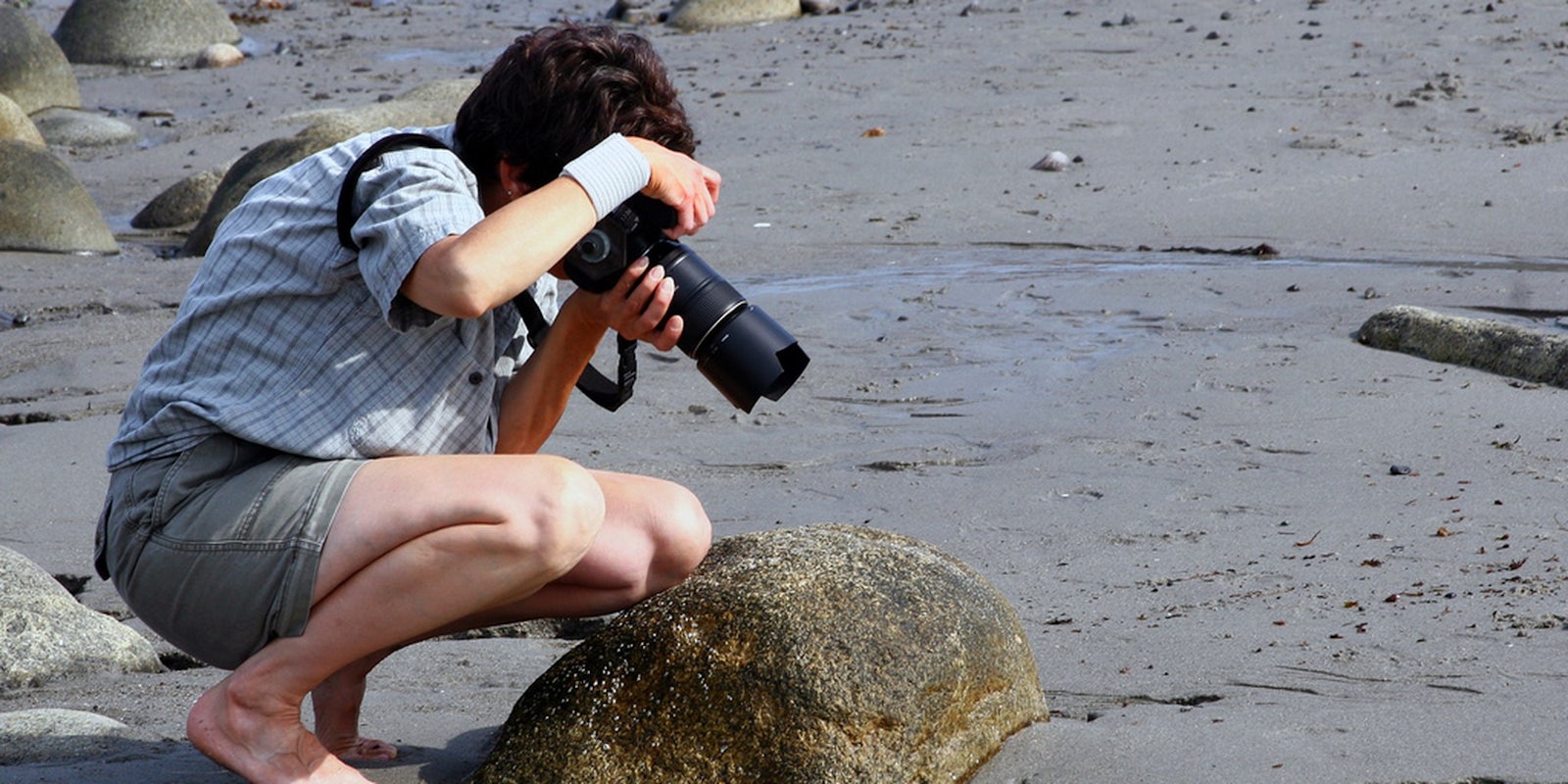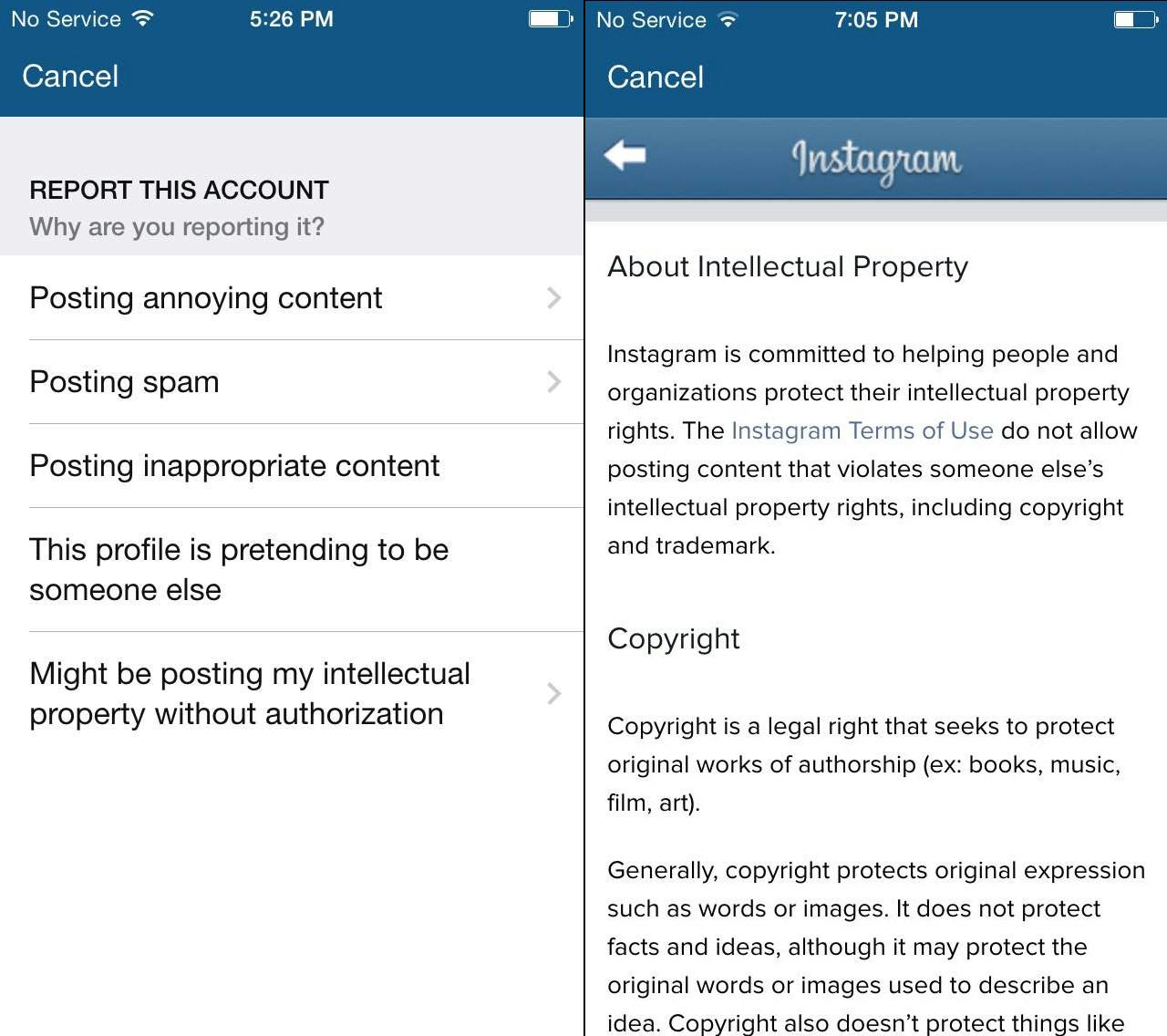Instagram thievery isn’t uncommon. Complaints have riddled the Internet for years from frustrated bloggers and artists who want people to credit their work. Some accounts even steal other people’s baby photos for role-playing games, a creepy little niche of the app that illustrates just how easy it is to rip off someone’s content.
One artist and Instagram user, Jen.yc, recently found herself in this position. One of her photos was used without permission by the graffiti artist PlasmaSlug. A friend had photographed Jen.yc capturing PlasmaSlug’s artwork near railroad tracks, and he then shared her photo to his own Instagram page (which has over 7,000 followers).
Jen.yc reported the artist for copyright violation. In response, PlasmaSlug posted the email he received from Instagram, which contained Jen.yc’s personal information, along with the original photo, to Instagram. His followers proceeded to spam her with hateful comments.
It’s been a few days since the photo containing her personal information was posted to Instagram, and she’s still getting negative comments on her photos. I was first alerted to Jen.yc’s harassment after New York Magazine editor Lainna Fader tweeted about witnessing it on Instagram. I spoke with Fader, who provided additional information about Jen.yc and a screenshot of PlasmaSlug’s post. I’ve reached out to Jen.yc for comment and haven’t heard back. (Because PlasmaSlug’s account is set to private, we won’t share the screenshot of his post; it has since been deleted.)
https://twitter.com/lainnafader/status/567790184843190272
Certainly this harassment is unfair, but did Instagram actually violate anyone’s privacy?
According to the Electronic Frontier Foundation, when a user complains of a copyright violation, the company that receives the complaint should provide the person accused of stealing content with some information on how to contact the person who reported them. That way, they have recourse if they want to challenge it.
First, if users don’t reliably have information about which rightsholder is complaining about which particular piece of content, their ability to appeal is severely restricted. And second, users who send a counter-notice are required by law to provide full identifying information to the original takedown sender; they should have access to the same level of information in making that decision.
But many people on Instagram, including both Jen.yc and PlasmaSlug, want to remain anonymous, and sharing personal information with a third-party can result in harassment, as we’re clearly seeing.
So what actually happens when you report a photo on Instagram? Well, as I found out, it’s a fairly broken and buggy system. My editor, Molly McHugh, tried to report one of my photos using Instagram’s mobile app, and was unable to. The application took her on an endless loop through two different screens, resulting in an ability to report anything.
When I tried to report her via iPhone app, I was unable to do anything besides flag the account. So instead I went to the Web, searched for Instagram’s help pages, and filed my own copyright report. After a quick scan through Instagram’s policy about sending a copyright complaint, I didn’t notice anything about my information being sent to the person I’m reporting.
Once I filled out the entire copyright complaint, though, and thoroughly read the copyright FAQ, I found this:
Note that we regularly provide your contact information, including your name and email address, the name of your organization or client who owns the right in question, and/or the contents of your report to the person who posted the content you are reporting. You may wish to provide a professional or business email address for contact by users.
There it was, plain as day. TL;DR: It’s quite difficult to report someone on Instagram for stealing your content in the first place, but Instagram is not hiding the fact that if you do, they could tell the person you’re behind the complaint.
Nonetheless, there are a few ways for users to report accounts that are using their work without permission. Reporting or flagging someone for spam alerts Instagram that the account is posting inappropriate photos, and the company may or may not react on it. Filing a copyright complaint is usually the best course of action for this scenario, as Instagram alerts the person and takes the photo down.
But you should know that in alerting them, the company shares your personal information with the person you’re reporting for copyright violation. And many people think this is a violation of user privacy.
https://twitter.com/lainnafader/status/567790476238270468
https://twitter.com/lainnafader/status/567790745613262849
Though users need to be able to contact the people accusing them of copyright infringement, Instagram providing people with personal data immediately might not be the only course of action. In the EFF’s Copyright and Trademark Bullies report in which the organization ranks companies for how they handle complaints of copyright, the EFF states that just promising to provide the accuser’s contact information when requested is enough.
Services earn a star in this category for requiring a formal, complete, and valid DMCA notice for copyright-based takedowns of content. Services must also commit to forwarding the information contained in that notice to the affected user. In some cases services make that information available only upon request; where a service has made a public promise to do so, we have awarded a star. [Emphasis added]
With increased fears over online harassment, especially for women, protecting personal data and the safety of users is more important than ever—but so is ensuring people or companies can’t take advantage of copyright claims to silence speech. It’s an unfortunate Catch 22.
The unfortunate lesson in all of this is that yes, artists are going to come up against copyright complaints if they use Instagram, and yes, if you want to fight for your photos, you have to give up your anonymity. But the other side of this is that Instagram also needs to improve the process, which right now is ineffective and anything but user-friendly. In fact, all of the legalese in the explanations of how to flag such photos isn’t going to reach most of its users, and it should be explicit that your anonymity is on the line.
“I think that it’s important that kind of bullying behavior is acknowledged as separate,” Parker Higgins, an activist at the EFF said. “If you are going to complain about a copyrights violation, you have to at least say who you are or who the copyright holder is. Someone can take that information and abuse it, but there’s a good reason why it’s sent in the first place.”
Photo by Liz West/Flickr (CC BY 2.0)



